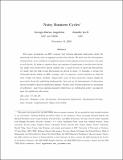Noisy Business Cycles
Author(s)
Angeletos, George-Marios; La'O, Jennifer
Downloadarticle (756.7Kb)
OPEN_ACCESS_POLICY
Open Access Policy
Creative Commons Attribution-Noncommercial-Share Alike
Terms of use
Metadata
Show full item recordAbstract
This paper investigates a real-business-cycle economy that features dispersed information
about the underlying aggregate productivity shocks, taste shocks, and—potentially—shocks to
monopoly power. We show how the dispersion of information can (i) contribute to significant
inertia in the response of macroeconomic outcomes to such shocks; (ii) induce a negative shortrun
response of employment to productivity shocks; (iii) imply that productivity shocks explain
only a small fraction of high-frequency fluctuations; (iv) contribute to significant noise in the
business cycle; (v) formalize a certain type of demand shocks within an RBC economy; and
(vi) generate cyclical variation in observed Solow residuals and labor wedges. Importantly, none
of these properties requires significant uncertainty about the underlying fundamentals: they
rest on the heterogeneity of information and the strength of trade linkages in the economy, not
the level of uncertainty. Finally, none of these properties are symptoms of inefficiency: apart
from undoing monopoly distortions or providing the agents with more information, no policy
intervention can improve upon the equilibrium allocations.
Date issued
2010Department
Massachusetts Institute of Technology. Department of EconomicsJournal
NBER Macroeconomics Annual 2009
Publisher
University of Chicago Press
Citation
Angeletos, George-Marios, and Jennifer La'O. “Noisy Business Cycles.” Chapter in NBER book NBER Macroeconomics Annual 2009, Volume 24 (2010), Daron Acemoglu, Kenneth Rogoff and Michael Woodford, editors (p. 319 - 378).
Version: Author's final manuscript
Other identifiers
NBER working paper w14982
ISSN
0889-3365